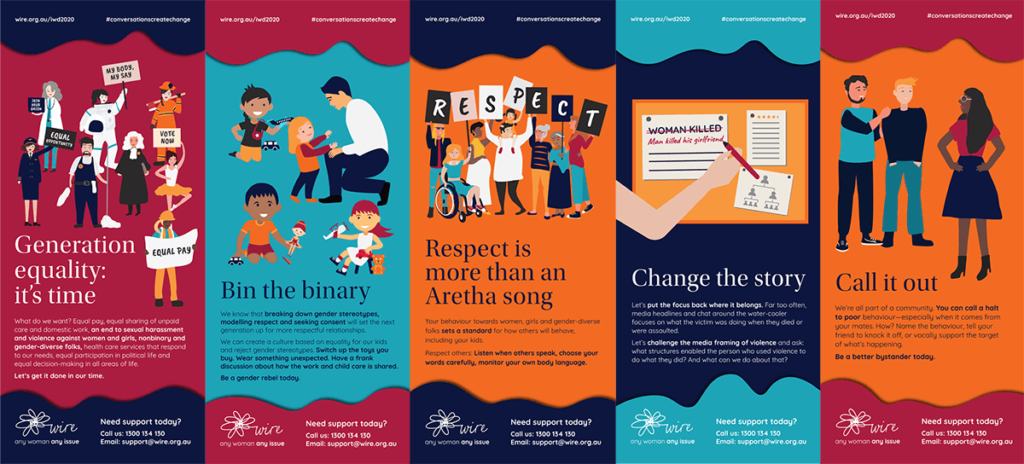16 days of activism
Download our activist posters against gender-based violence.
Gender equity is a social justice issue that will take all of us working together.
It starts with how we raise our children and grows into how we treat each other and hold our mates to account. It’s reflected in the ways we talk about crimes against women and gender-diverse people. And the value we place on women and gender-diverse people in our society is sadly reflected in how much we pay in industries considered “women’s jobs”, in the health outcomes for women and gender-diverse people and in the terrible rates of family violence and murder of women and gender-diverse people in Australia every week.
It’s important to acknowledge that the gendered violence we see in awful events like the murder-suicide of the Baxter family doesn’t come out of nowhere. It is supported by rigid gender roles, a social culture that condones poor behaviour and a reporting culture that blames victims for what happens to them.
Let’s work together for a violence-free Australia
Our International Women’s Day poster campaign is demanding change across our culture and you can too. You can also download and print the posters at home to take to an IWD rally near you.

We want change and we want it in our lifetime. Everyone in the community, from schools to sporting clubs, has a role to play in changing the structures, norms and practices that lead to violence against women.
Over the last century, we have made significant progress for gender equality in Australia; increased participation in education and work; increased prominence in leadership roles; and the development of a National Plan to Reduce Violence Against Women.
Globally, we have been part of a shift towards calling out sexist behaviours and the effects of patriarchy. The #MeToo movement, started by Tarana Burke, is just the latest in a long history of feminists speaking up against sexual harassment and speaking out against gender discrimination and abuses of power.
Yet, progress on gender equality is slowing down. At the current rate of change, research findings suggest that it will take another 108 years to close the overall gender gap. Australia ranks 46th overall in the World Economic Forum Global Gender Index.
For every statistic you see about women, you can be certain that the situation is worse where the person experiences the intersecting effects of racism, ableism, homophobia, biphobia, transphobia and colonisation. According to ANROWS findings, Indigenous women are still 35 times more likely to be hospitalised due to family violence related assaults. Family violence is the leading cause of death and disability for women aged 18-44. Women retire with half (53%) the superannuation of men and are 2.5 times more likely to live in poverty in old age.
This isn’t good enough.
We want change and we want it in our lifetime.
We want equal pay for work of equal value. We want the equal sharing of unpaid care and domestic work in households. We want an end to sexual harassment and violence against women and girls, nonbinary and gender-diverse folks. We want health-care services that respond to our needs. We want equal representation in positions of leadership and power, and equal decision-making in all areas of life.
Let’s get this done, together.
Creating gender equity starts right at the very beginning. We need to shift the ways that we handle gender at home, in school, at work and bin the gender binary. Research shows that rigid ideas of masculinity and femininity are strong drivers of violence against women, nonbinary and gender-diverse people. Empowering the next generation with more gentle, respectful ways of being in the world will likely have transformative flow-on effects. Read more »
Lots of us love RESPECT — the Aretha song. Who wouldn’t? It’s the song of a strong black woman asking for what she needs. But how many of us really put the song into practice?
1 in 4 young people don’t think it’s serious when guys insult or verbally harass girls in the street.
Your behaviour towards women, girls, non-binary and gender-diverse people sets a standard for how others will behave, including your kids. Respect others: listen when others speak, choose your words carefully, monitor your own body language.
We don’t yet live in a world where everyone is respected, so people behave badly from time to time. That doesn’t mean we can just let cruel comments or inappropriate actions stand. You can call a halt to poor behaviour — especially when it comes from your mates. How?
Be a better bystander.
The action might be:
Stand up, don’t stand by.
When the worst occurs, and someone is raped or murdered or both, often by a person they know, we still have a responsibility to them in how we talk about it.
The media has a powerful role in how it presents — frames — violence against women, non-binary and gender-diverse folks. And it has a fundamental role to play in stopping rape culture. Let’s challenge the media framing of violence that blames victims and instead use the power of language in service of survivors, not those who use violence.
What would happen if we ask: what structures enabled the person who used violence to do what they did?
There are a variety of ways we can show our support for the person experiencing harm and place the blame with the person who has caused harm.
These posters can be printed at A4 or A3 and pasted onto cardboard for use at IWD rallies this week. We look forward to seeing you there.
Download our activist posters against gender-based violence.
Abuse of any kind within a relationship is family violence. Under Victorian Law,...
Financial abuse is a form of family violence. Financial abuse can happen to ...